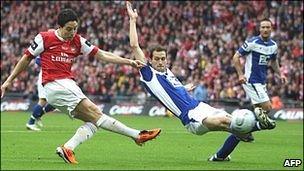Arsenal makes loss on reduced sales of players
- Published

Arsenal were beaten by Birmingham City in the Carling Cup final
Premier League football club Arsenal recorded a £2.5m ($4m) loss in the half year to December 2010, largely on the back of reduced player revenues.
There were no major player sales in summer 2010, unlike in previous years when the club made a big-name sale.
The loss contrasts with a £29.2m profit in the corresponding period a year earlier.
The results come a day after the London club lost the Carling Cup final by 2-1 to Birmingham at Wembley.
'Sustainable'
In the 2009 close-season the club made £33.9m from player sales, including Kolo Toure and Emmanuel Adebayor leaving to join Manchester City.
But in the summer of 2010 it only made £4m from player sales.
Arsenal's determination to hold onto its current big name players was reiterated by chief executive Ivan Gazidis, who told the BBC on Sunday "we have a sustainable business model".
"It gives us the strength to say we don't need to sell [captain] Cesc Fabregas to raise money," he said.
Football operating profit, before depreciation and player trading, was £9.3 million, compared to £18m in 2009.
And operating profit before depreciation and player trading was £12.6m, down from £29.3m in 2009.
'Robust'
The club said there had been a reduction in income from the sale of property, but that it had sold 50 apartments at the Highbury Square complex at its former stadium.
Those sales generated revenue of £22.5m, compared to £96.6m from the sale of 261 flats a year before.
In addition, by 30 November 2010 Arsenal had only played 10 home games at their Emirates stadium compared to 12 in the same period the year before.
"This is a robust performance in the current climate and is where we expected to be at this stage of the financial year and at this stage in our longer term development plans for the growth of the club," said Peter Hill-Wood, club non-executive chairman.
He added: "We continue to operate as a self-funding club. This brings its own challenges in an increasingly competitive environment but provides the platform for a secure and positive long term future."